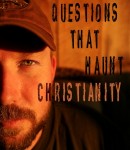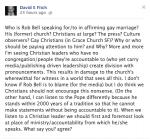There’s been a lot of talk about gay students at Christian colleges lately. I’ve blogged about it several times, as have others. But we haven’t heard much from gay faculty at these schools. That’s because they are deep, deep in the closet.
Inside Higher Ed has an anonymous essay by one such prof:
Much of this debate at your institutions hinges on biblical hermeneutics. It dismays me how CCCU [The Council for Christian Colleges and Universities] institutions (institutions of higher education!) will cite biblical passages as if the passages are self-interpreting, thus adopting a hermeneutical practice of simplistic literalism. I have been struck by the fact that while CCCU institutions will not hire faculty in monogamous, same-sex relationships, they do hire divorced faculty without asking the grounds for the divorce. Wheaton College in Illinois is tragically consistent in its foundationalist approach to biblical hermeneutics, allowing faculty to be divorced so long as the divorce is based on biblical grounds. Do you seriously think that the great professor ceases to be a great professor because his/her divorce was based on irreconcilable differences rather than adultery?
One year I received a teaching award. If I were to come out now, would I suddenly cease being a good teacher? Would I no longer be able to ask disciplinary-related questions that spring from my religious faith?
As you know, millennials’ views of religion and homosexuality are rapidly changing. Will your institutions continue to attract students? Some alumni will not want to donate, and some foundations will not want to make grants. A friend suggested that the CCCU, like the Republican Party, may need to change to survive, or that those institutions that want to be more prophetic, courageous, and progressive and who believe that God’s revelation continues to unfold will need to leave the CCCU.
The courageous thing for me to do would be to come out. Gay students, knowing that I was sympathetic, have talked to me about their struggles with family and church. I would have liked to have been open about my own journey in these conversations, but was silent. It pains me to think that my silence contributes to homophobia. But as I stated, my acceptance of my sexual orientation came later, rather than earlier, and thinking about making a move now is daunting.
Read the rest: Essay about being a gay faculty member at a Christian college | Inside Higher Ed.












